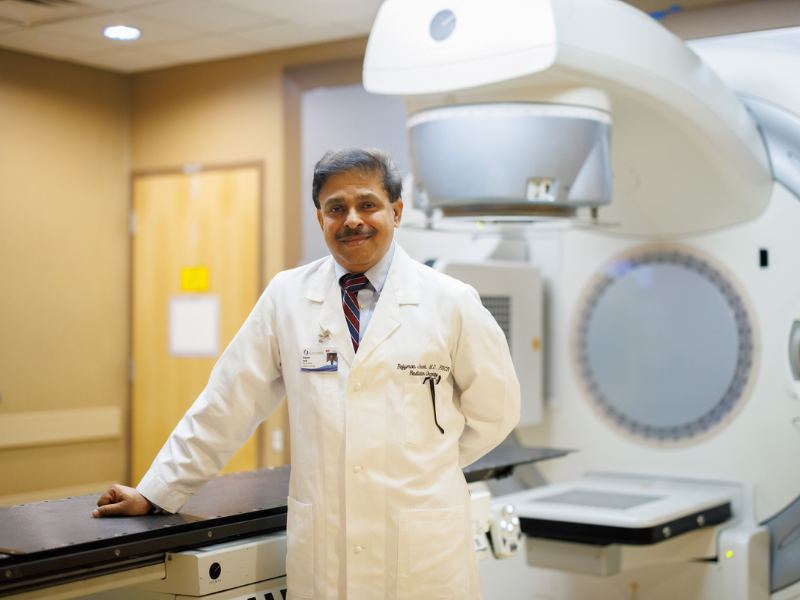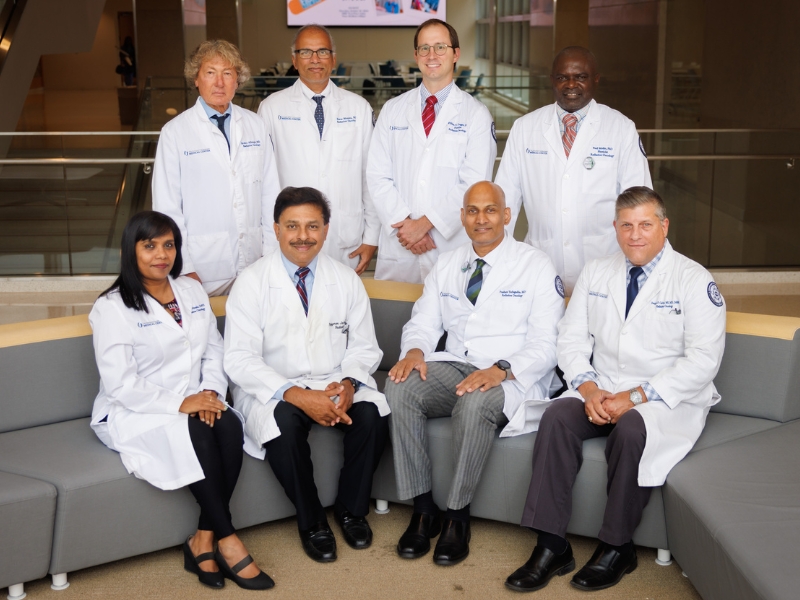Passion to care, mentor guides career of new radiation oncology chair

As far back as he can remember, Dr. Rojymon Jacob always knew it was his mission to care for people.
“My favorite summer reading growing up was always the next year’s biology textbook,” Jacob joked. “I was always so excited to get the new biology textbook during summer vacation. The first thing I would do was turn to the section about human anatomy. That was always my favorite thing to learn about.”
His passion for medicine never wavered throughout his adolescence. When it came time to consider his future, Jacob’s path was clear, though his mother worried he was being too single-minded. “When we had to check boxes indicating what types of education we were interested in, I only checked one: medical school,” he recalled. “There was never any doubt in my mind.”
Jacob’s passion led him to the University of Mississippi Medical Center to become the new chair of the Department of Radiation Oncology He previously served as professor of radiation oncology at the University of Alabama, Birmingham and lead gastrointestinal radiation oncologist for UAB Medicine, bringing with him over 30 years of clinical experience in the field.
In the 1980s and 1990s, while studying at the University of Kerala in India, Jacob noticed a critical shortage of oncology specialists. “Our medical school was filled with cancer patients—extremely sick people with few cancer specialists to care for them. That need drove me to pursue oncology.”
While many of his classmates opted for what he describes as “more glamorous” specialties, Jacob was committed to forging his own path.

“I had the grades to pursue other specialties, but I wanted to go into a field where I felt like I could help the most people,” he said. “This was before all the technology and research that we are working with today. In the early 2000s, lots of changes began happening in the oncology sphere. There were new drugs coming to market, and radiation oncology grew tremendously due to improvements in computing and technology. But I did not choose radiation oncology due to my fascination for technology. I chose it because I was convinced that these changes would impact the way patients were being cared for.”
After earning his medical degree and gaining some early lecturing experience, Jacob sought opportunities to grow beyond his roots. The rapidly evolving field of radiation oncology led him to the United Kingdom, where he completed fellowship training at Royal Marsden Hospital and the Royal College of Radiologists before moving to the United States in 2002.
“I was fortunate to enough to get a fellowship training in intensity-modulated radiation, under Dr. Alan Pollack, one of the most highly reputed radiation oncologists at Fox Chase Cancer Center in Philidelphia,” he said. “That’s where I really consolidated my love for radiation oncology and got very familiar with state-of-the-art technology.”
Jacob’s enthusiasm for advancing care and helping underserved areas guided his career choices. After his fellowship, he accepted a position as a visiting assistant professor at the University of California, Davis. It was there that he sharpened his focus on gastroenterology. “I did not start out wanting to do GI specifically, but that is where I was needed. I worked with Dr. Michael Tanaka and Dr. Vijay Khatri, who were incredibly supportive and furthered my interest in the field,” Jacob said. “I gained so much experience treating GI cancers, that when I moved from California to UAB, I specifically requested to treat GI cancers.”
For 18 years, Jacob was an integral force developing and expanding the GI services in the Department of Radiation Oncology at UAB. When he began in 2006, Jacob said the department was small with few faculty members. Years later, it is a fine-tuned orchestra complete with over 15 faculty members, running highly specialized, multidisciplinary clinics.
Jacob said he felt like his work at UAB was done, propelling him to seek opportunities to help develop other centers. “I could have stayed on and kept working there,” he said. “But at the point we had gotten to, I knew someone could easily step in and keep running the GI radiation service. I wanted to go where I was needed. I wanted to help another center build itself up to that level.”
"Dr. Rojymon Jacob’s nationally renowned expertise and commitment to enhancing patient care make him the ideal choice as the new chair of RadOnc at UMMC,” said Dr. Rodney Rocconi, Ergon Chair of Cancer Research and Director of the UMMC Cancer Center and Research Institute. “His leadership will be instrumental in advancing our mission to establish an NCI-designated cancer center, ensuring that all cancer patients in our state receive the highest quality of care."
In his role as chair of radiation oncology at UMMC, Jacob will lead both clinical care and research initiatives, oversee the modernization of the practice, establish quality standards and enhance the training of radiation oncology residents. He will also be responsible for faculty development and mentoring within the department.
He looks forward to working with leadership towards the Medical Center’s plan to develop a hub for taking care of Mississippians with cancer.
“We want to develop a state-of-the-art cancer center, on par with any other leading center in the world, by strengthening our surgical, medical and radiation oncology teams” Jacob said. “We want to attract oncologists who want to be clinical site leaders. My goal is to build a talented team around me of highly motivated clinicians and to help foster an environment where they can grow and create change.”
Another goal of the department is to build the residency program to create excellent radiation oncologists, who could serve Mississippi in the future,” Jacob said. “We want to evoke interest in radiation oncology among our medical students, by providing an early introduction to the specialty, which will then spark the interest to join our residency program.”
By fostering a collaborative environment, advancing research and mentoring the next generation of radiation oncologists, Jacob is determined to transform UMMC into a leading cancer care hub in Mississippi, delivering vital services to patients across the region.


